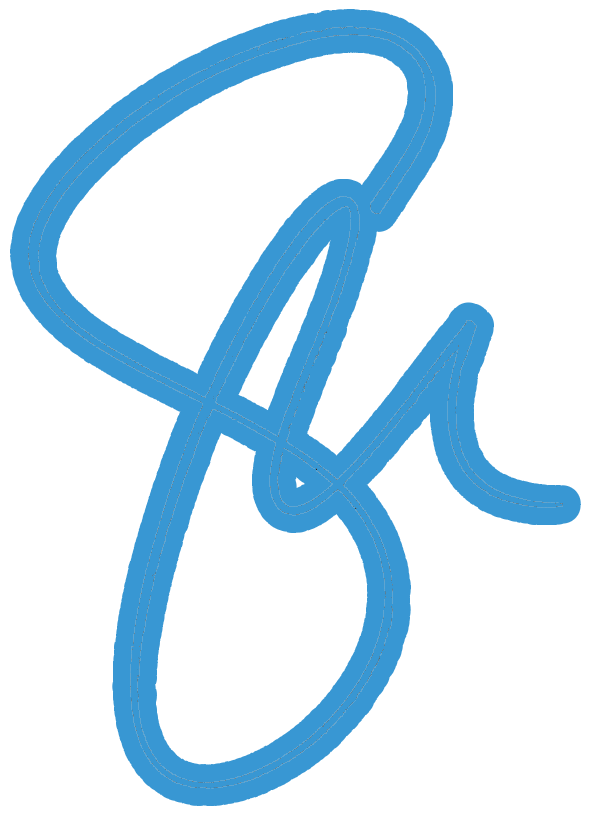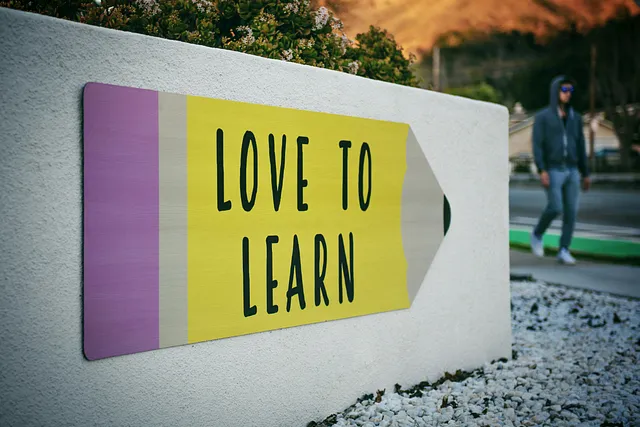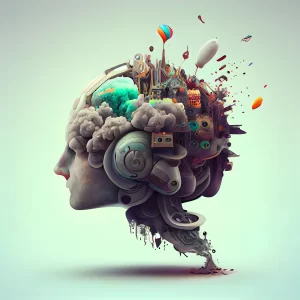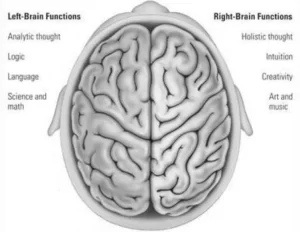Let’s start with Steve Jobs’s quote about learning.
You can’t connect the dots looking forward; you can only connect them looking backward. So, you have to trust that the dots will somehow connect in your future. You have to trust in something — your gut, destiny, life, karma, whatever. This approach has never let me down, and it has made all the difference in my life. — Steve Jobs
Learning is all about being open-minded. You don’t need to be stuck or think you know a lot. The world has much more knowledge than we will ever know in our tiny lifespan.
Many successful people have this habit of continuous learning, especially from books. Steve emphasizes learning what you want to learn, and there is a possibility that the dots will connect down the road, which will make sense on why you initially learned that skill.
Many successful people maintain a collection of unread books. Nassim Taleb calls it an Anti-library. It is a collection of books we bought; however, we still need to find time to read or maybe leave this world without reading them. It gives us a concept of humbling.
These skills will help you in every aspect of life, personal and professional. I recommend learning the fundamentals even if you work in different industries. Let’s say you work in the health sector and are 50+ years old.
I used to work for a company that made online courses for the health sector, or it basically worked as a service industry. You are a client; you have a problem; we are there to find a solution for you.
I often had to jump on calls with doctors, lawyers, and executives in the health sector who needed to learn how data works or what cloud storage is before even sharing their pain points in the business.
What skills do you need to learn the fundamentals?
Reading
According to the World Economic Forum, these are the top 10 crucial skills everyone needs to learn if they want to lead a successful personal and professional life. I am going to focus on the top 5.
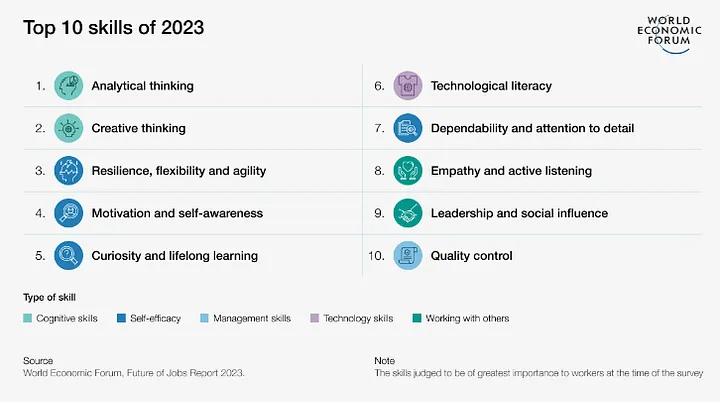
Creative Thinking
Creative thinking simply means a process of finding innovative ways to solve problems. Let’s take an example to solidify this concept.
Creative thinking in the workspace
- Meet with the team and get all the inputs, or I will simply do a brainstorming session.
- They are evaluating what we are doing now, and here are the suggestions to improve or completely reinvent the wheel (better solution).
- Reaching out to prospective clients through an innovative way
- Finding a new way to promote company products or measure current products and how to scale through an innovative way
How to learn creative thinking:
- be open-minded
- Skill# 3 — be curious
- Challenge assumptions and innovative solutions arise when we challenge the norms or established solutions.
- Collaborate and arrange brainstorming sessions with your team.
- Keep experiemnting my shameless plug-in in. I have done 29 30+ days experiments on how to live a healthy and productive life.
- Learn from failure
- Go on long walks to boost your creative thinking muscle.
Analytical Thinking
Analytical thinking simply means evaluating the information, facts, data, experience, and wisdom and then finding a solution. Now, the following question may arise in your brain.
Analytical thinkers excel at identifying patterns in data to predict future trends.
What is the difference between analytical thinking and creative thinking?
When I was learning creative thinking, we did it when we generated ideas; I used to call it when we improvised.
Analytical thinking involves in-depth search, data analysis, problem-solving, and decision-making.
How to learn analytical thinking:
Instead of saying how to learn analytical thinking (article flow), I would say how to improve analytically; I truly believe everything has some analytical skills regardless of career choice. You can even function normally in daily life if you do not have analytical skills.
- Learn math (Learn this skill that’s the backbone of analytical skills)
- Develop a learning habit, pause for a second, think while reading a book or article, and think what you would do if you were in the driving seat.
- Read a lot — here are my 28 rules to build a sustainable reading habit
- Play chess and mind games.
- Develop a writing habit; it will help you bring all your thoughts in a coherent way.
- Learn how to use analytical tools; if you are free, take a course on how a computer language works. Take a crash course in Python.
- Stay curious
Technological Literacy
Ahh, where would I start? It simply means how to use, manage, and understand technology.
Here are a couple of examples of technology literacy:
- For example, if you want to write on Medium (creating content), you need to understand how to create an account, format your article, publish, etc.
- How to promote your stuff, you can hire a person but a basic knowledge of what they will help you a lot.
- It’s as basic as sending and receiving an email.
- Using these new tools, video conferencing
How to learn technological literacy:
- Start with basics, how the operating system works, what file management is, and how to explore the internet.
- If you are interested in how the computer works, what happens when you type, or do a simple addition, maybe take a crash course in programming.
- Read tech blogs
- Don’t worry about experimenting.
- Stay informed via newsletters or podcasts.
- Explore how new technologies work. What is the internet of things (IoT)? How does the blockchain work?
Book:
Here is a book with simple examples to help you understand how Google, cloud computing, or the basics of technology.
Swipe to Unlock by Aditya, Neel, & Parth — A primer on technology and …
Curiosity and lifelong learning
Curiosity is a strong desire to learn or know something. — Valaims
and
Lifelong learning (perpetual learning) is a form of self-initiated education that is focused on personal development.
Curiosity and lifelong learning help us to learn new tools and resilience to adapt and thrive in the ever-changing world.
How to learn Curiosity and lifelong learning
I wrote a detailed article on the importance of lifelong learning and shared my views on why Oprah, Bill Gates, and Warren Buffett practice the 5-hour rule.
The 5-Hour Rule: You Are Being Reckless if You Do Not Spend 5 Hours Each Week Learning
Resilience, flexibility, and agility
If someone asks me what resilience is, give me an example to solidify the concept. I will say this.
It’s the ability to bounce back from a difficult event. For example, I have a growth mindset and try something multiple times without giving up.
I will share a practical example of Oprah.
Oprah Winfrey
She grew up poor, in fact, in terrible conditions back in her home. As a poor black woman in America, she had all the odds against her. However, she persisted and became one of the most influential and powerful people in the world.
Flexibility simply means adjusting yourself promptly; therefore, you can deal with unexpected tasks effectively.
Let me recall the resilience, flexibility, and agility.
Resilience
Resilience is the ability to withstand adversity and bounce back from difficulties. — Everyday Health
Flexibility
Flexibility is the capacity to adjust to short-term change quickly and calmly so that you can deal with unexpected problems or tasks effectively. — Mind Tools
Agility
Being flexible, quick to adapt, and responding to a changing world. — LinkedIn
How to learn resilience, flexibility, and agility:
Resilience, flexibility, and agility are not skills but character qualities innate in all of us. We can create an environment to improve through a growth mindset.
Learning these skills or characteristics is essential in this chaotic world where many of my friends got laid off. Instead of thinking it a failure, it’s the right time to focus on developing these characters.
The bottom line
Now is the right time to focus on developing these skills. These skills will help you to be ready for the future. Let me recall the skills.
- The ability (polish skill) to consider something in an innovative (new) way
- Develop a skill to analyze massive information effectively
- Stay up to date with new technology, the knowledge and skills to understand the fundamentals of tech
- A lifelong approach to learning to improve personal and professional life.
- Develop a skill to adapt, recover, and thrive, especially in the face of challenges.
Thank you for reading. I wish you a happy and healthy life.
